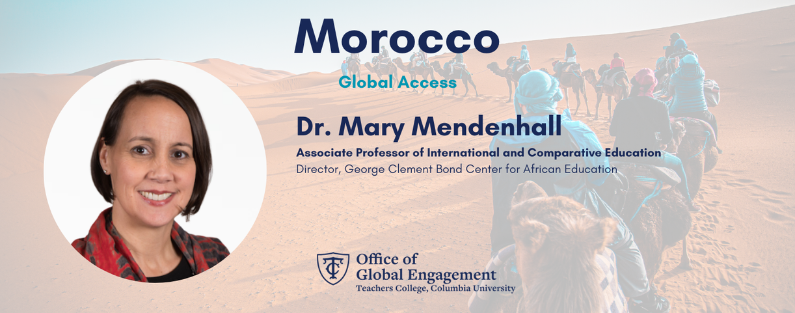ITSF 4199: Education, Refugee & Migration Policies & Practices in Morocco

COURSE DESCRIPTION
Morocco stands at a critical juncture in global migration flows, serving both as a transit country and increasingly a destination for refugees and migrants en route to Europe. As migration dynamics continue to shift, education emerges as a critical tool—not only for supporting the academic and psychosocial well-being of displaced children and youth, but also for fostering their successful integration into host communities. However, formal educational frameworks for refugees and migrants, particularly those in transit, remain fragmented and heavily dependent on the efforts of international governance organizations, NGOs, and informal community networks. Addressing the policy and practice barriers faced by local, national, and international stakeholders is essential for advancing more cohesive and effective educational responses.
This 10-day, field-based, interdisciplinary program offers participants an immersive exploration of Morocco’s migration ecosystem, with a concentrated focus on education policies and humanitarian responses for refugees and migrants. Through a blend of academic lectures, site visits, stakeholder consultations, policy labs, and cultural engagements, participants will develop a nuanced understanding of the policy frameworks, institutional strategies, and grassroots initiatives shaping educational access and quality for displaced learners. The program fosters a holistic and critical perspective, equipping participants to analyze challenges and contribute to actionable solutions.
COURSE OBJECTIVES
- Develop an in-depth understanding of Morocco’s complex role as a “gatekeeper” for Europe, including its legal frameworks, bilateral agreements with the EU, and international conventions governing migration and asylum.
- Examine national and local policies affecting education for refugees and migrants, including the interplay between official government policy, international agreements, and the work of UN agencies and NGOs.
- Identify the challenges and best practices in providing educational opportunities—both formal and non-formal—for refugee and migrant learners, focusing on language acquisition, psychosocial support, curriculum adaptation, credential recognition, and youth empowerment.
- Interact with a wide range of stakeholders (Ministry officials, humanitarian organizations, local NGOs, school administrators, migrant community leaders, researchers, and academics) to understand diverse perspectives and policy implementation realities.
- Synthesize insights into actionable policy recommendations or project proposals to improve educational outcomes for displaced learners in transit contexts.
COURSE TOPICS
- The EU-Morocco migration partnership: Examining how European externalization policies influence Morocco’s domestic education policy for migrants.
- UNHCR’s role in educational interventions: Focus on bridging gaps in formal schooling and recognition of credentials for refugee children and youth.
- Community-based education models: Analyzing local, grassroots initiatives that offer language training, literacy programs, and psychosocial support outside formal school systems.
- Policy innovation in urban schools: Investigating how Moroccan urban public schools are (or are not) adapting their curricula, teacher training, and support services to include migrant students.
ANTICIPATED STAKEHOLDER ENGAGEMENT
- Government Agencies: Moroccan Ministry of Foreign Affairs and African Cooperation (Migration Affairs Unit), local education authorities.
- International Organizations: UNHCR Morocco, IOM Morocco, UNESCO field representatives.
- Non-Governmental Organizations: GADEM, Caritas Morocco, local humanitarian and community-based NGOs working in refugee aid and education.
- Academic Institutions: Mohammed V University (Rabat), Abdelmalek Essaâdi University (Tetouan), and independent researchers specializing in migration and education.
- Private Sector: CSR wings of language schools or multinational firms, discussing scholarship programs or vocational training support.
TENTATIVE ITINERARY
Day 1: Arrival in Rabat – Setting the Stage
Day 2: Understanding the Policy Landscape in Rabat
Day 3: International Organizations and NGOs in Rabat
Day 4: Case Studies of Urban Education Access
Day 5: Humanitarian Aid and Private Sector Engagement in Casablanca
Day 6: Border Dynamics and Migration Pressures in Tangier
Day 7: The Northern Borders – Ceuta Context
Day 8: Policy Lab and Academic Exchange in Tetouan
Day 9: Cultural and Historical Context in Fez
Day 10: Return to Rabat – program ends